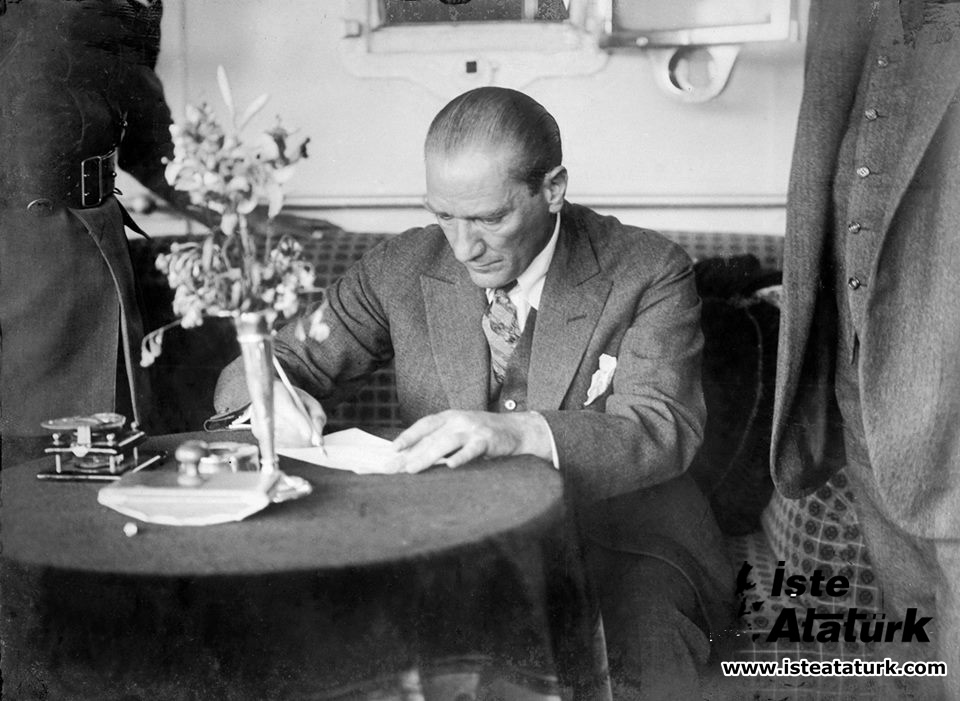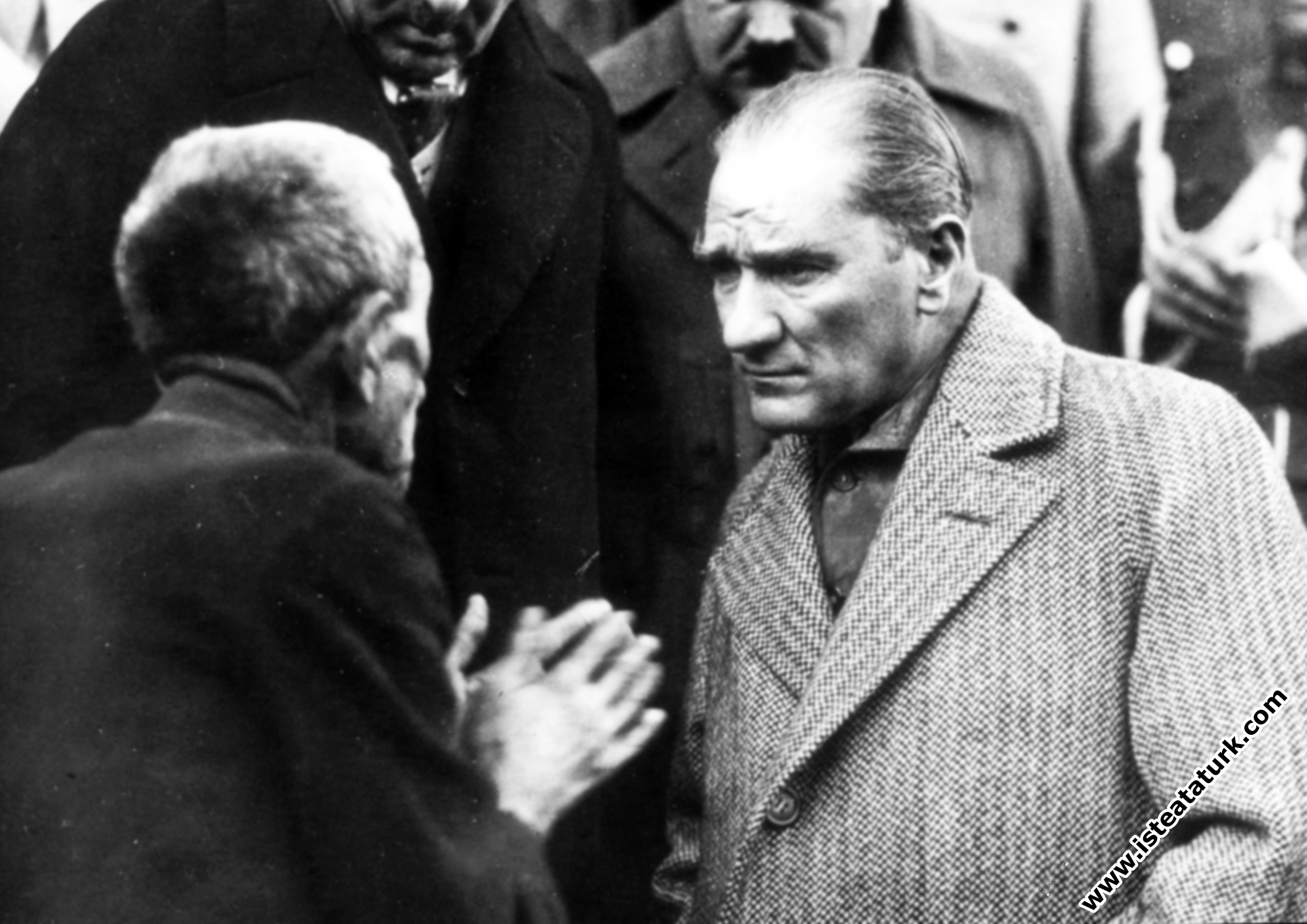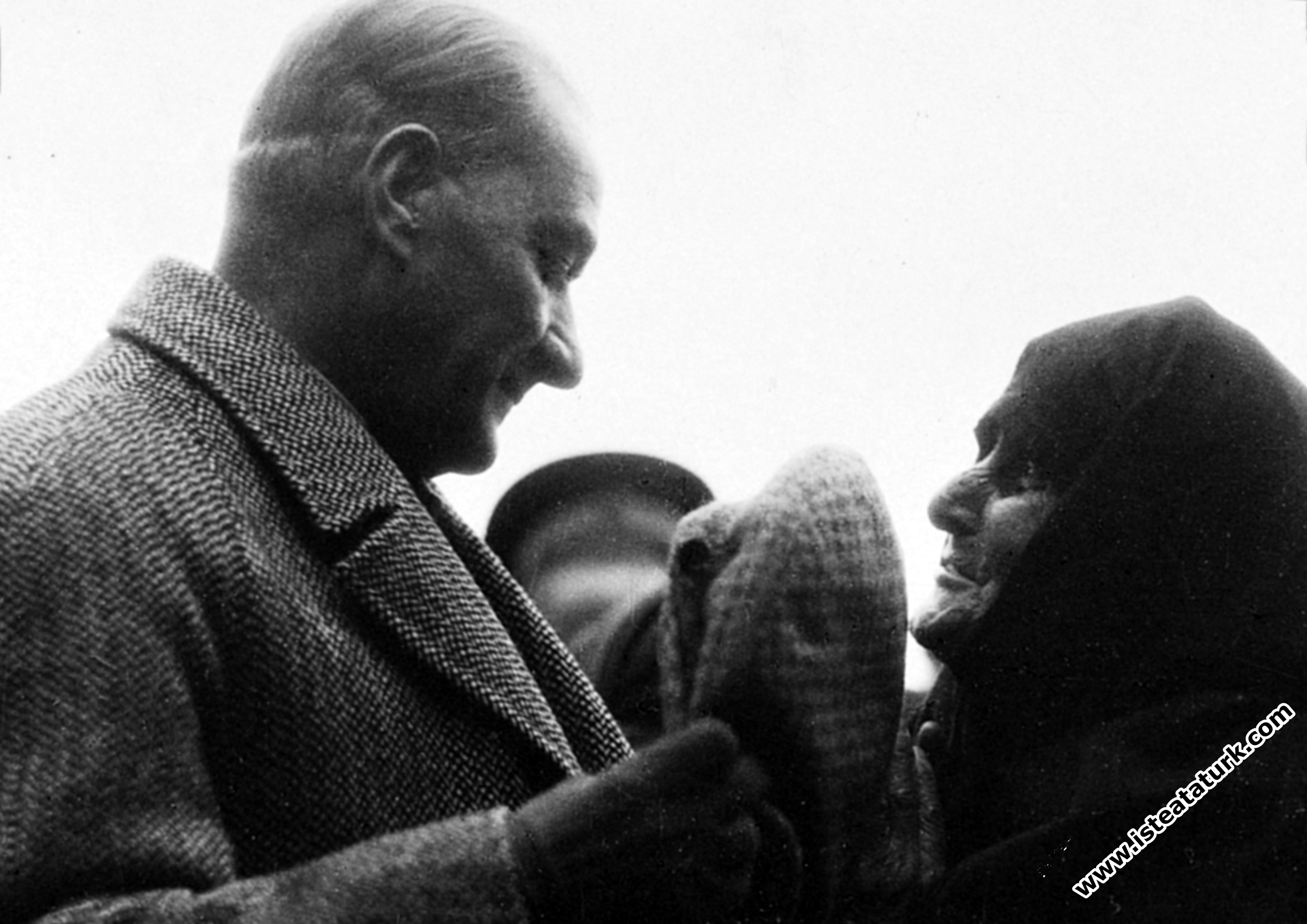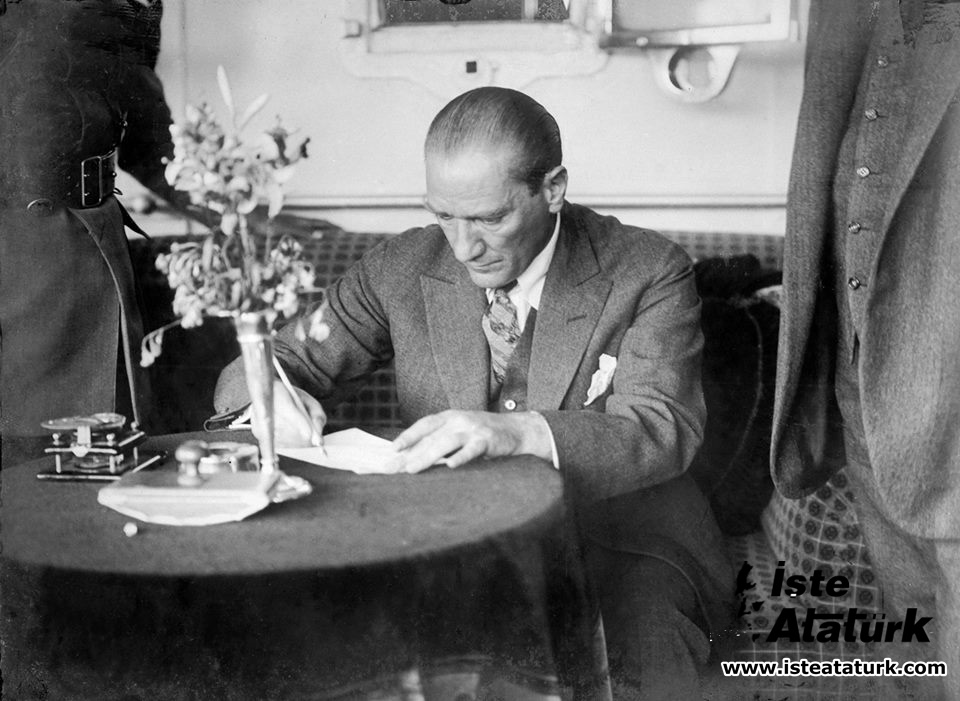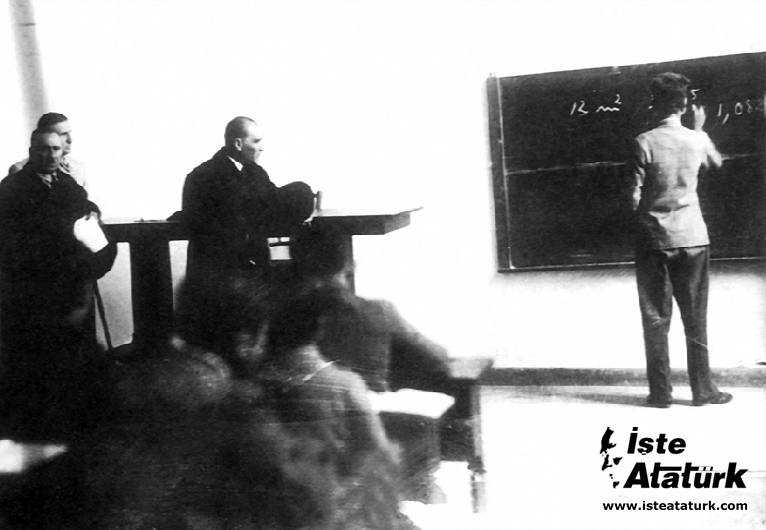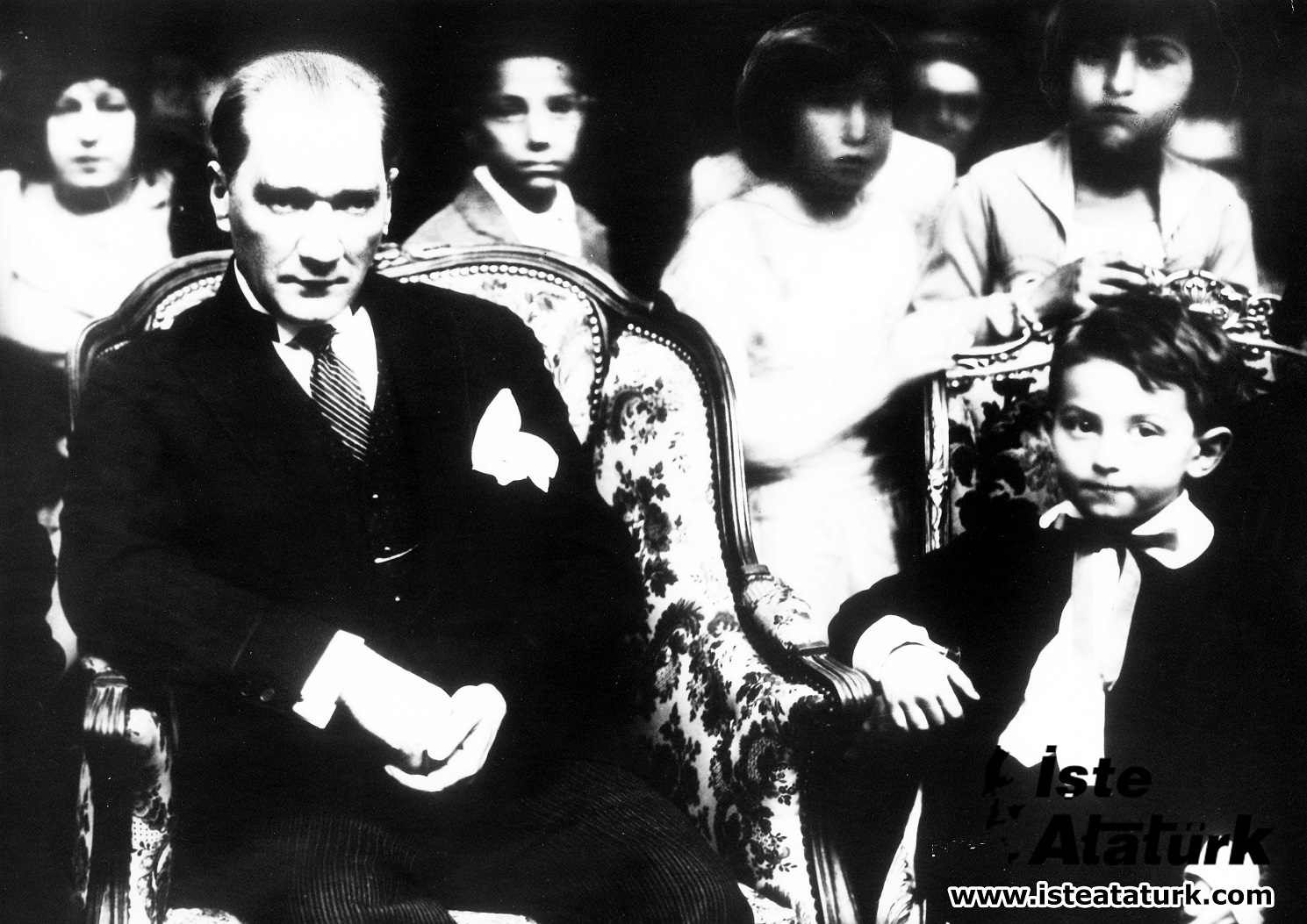
Atatürk's Philosophy of Love
Character Size
“A kindness to others is good to us as well. Evil to others is evil to us. For this reason, it is necessary to love good and avoid evil. Our deeds resonate with us in the form of joy or pain. This state announces to us the duties of conscience.” Mustafa Kemal Atatürk
ATATÜRK'S PHILOSOPHY OF LOVE
In our opinion, the most beautiful and powerful emotion that is put into human beings with care is love, whether they want it or not, human beings cannot pull this deep-rooted and sublime feeling out of their minds. Even if he wants to throw, he can't get enough. The aim is to know, understand, live and let live this sublime and deep-rooted feeling. The real problem is to develop and spread this love for the benefit of humanity. It is to use this truly beautiful feeling for the benefit of the country, the nation and the world of humanity. All the subtleties of human life are knotted in love. Love is the source of living a life in joy, peace and trust. The basis of love is always goodness, truth and beauty. At the same time, it is only possible for people to understand and support each other with love.
Thinking of every subject adequately, to the extent of its value and necessity, Atatürk lived in a unique philosophy of love from his birth to his death. For him, love is life itself. The philosophy of love that Atatürk presented to the world of humanity extends from individuals to society, nation and nations. Undoubtedly, it is also the source of international trust. Nations can only understand each other through love. They can be useful and helpful to the nations of the world as well as to their own nation. Atatürk's philosophy of love, which is based on rights, morality, compassion and humanitarian considerations, is indeed a very powerful light for the future of humanity. It is one of the greatest examples of his universality.
For a while, I had the pleasure of participating in the dinners of our late famous painter Çallı İbrahim. In these conversations, Atatürk was also mentioned frequently. In one such food talk, he said to the master Çallı İbrahim:
I said, “My teacher, who and what did Atatürk love the most”. With a sigh, or rather a deep breath, with his unique accent and style:
“—He didn't love anyone. He didn't like anything. He just loved the mass. He loved Turk, Turkishness. He had only these two in his eyes and in his heart. He lived for them. He would understand, know and admire those who loved these two," he said. Since I adopted this idea exactly, I chose to enter Atatürk's philosophy of love with this understanding.
Love from Mustafa Kemal to Atatürk
The strongest love in Mustafa Kemal is undoubtedly the love of country and nation. It is this love that creates and sustains his love of freedom and independence. If we refer to the events that took place from his birth to the proclamation of the Second Constitutional Monarchy with thick lines, we encounter the following scene:1 1880 Russians set to settle in the Turkmen region;
1881 French seizes Tunisia;
1882 British seizes Egypt;
1884 Russians take Merv, dominate the independent Turkmen country;
1885 Bulgarians take Eastern Rumelia, Italians take Musava and Beylut in Sudan;
1887 Italy gives rights to the British in Egypt, and they to the Italians in Sudan;
Armenian revolts of 1894-96. interference in our internal affairs;
1896 Crete comes out of Ottoman rule;
1898 British seizes Sudan;
1897 Ottoman-Greek War;
1899 Sheikh of Kuwait comes under British protection;
1902 France grants rights to Italy at Fezzan;
1903 Great Macedonian uprising;
1904 Nejd, Yemen and other uprisings;
1905 Great state navies seize the islands of Lesbos and Limnos for a while;
1906 The Ottoman government renounces its claims on Tur-u Sina and Aqaba. These places are considered to belong to Egypt, England;
1907 Britain and Russia agree on Iran;
1908 Negotiations to separate Macedonia from the Ottomans are held in Reval, between the King of England and the Tsar of Russia.
Mustafa Kemal learns about this situation of the Ottoman Empire, which is being tried to collapse, by reading. Undoubtedly, some of them did. It doesn't just read. It also predicts events and directions very well. That's why Mustafa Kemal, talking about the Turkish-Greek War in 1897: “I had the most exciting days of my youth life. Despite my young age, I really wanted to join this war. I was almost going to join the voluntary detachments”2. The war was short lived. The Ottoman army was victorious. But in reality the Greeks reaped the fruits of victory. Mustafa Kemal was very upset about this: “Our teachers told us that it was possible to invade all of Greece. When the news of the armistice came, our enlightened school officers felt great sadness. We knew this from their faces. But we couldn't ask anything. My only friend Nuri - a deputy Nuri Conker during the Republican era - told me that a young officer cried, "It shouldn't have been like this, it's a shame, it's a shame!" Again, festivities were held in the streets of the monastery, and (Long live my Sultan!) their lamps were rising. For the first time, I did not agree with this wish” 3 said.
As it can be seen, even at that age, Mustafa Kemal had a pure love of homeland and nation in his heart. Above all thoughts and feelings is this love. For this purpose, between the years 1906 and 1908 Vatan ve Hürriyet Cemiyeti; He will fight endlessly in the organizations he founded, which later became the Society of Progress and Union in Thessaloniki. With this burning love to his friends in the society, which later became the Union and Progress, he said: “Constitutionalism should not be built on the old and outdated Ottoman Empire, but on the part where the Turkish majority lived; Instead of a liquidation by its enemies, namely the great powers, the administration of the revolution should establish a Turkish State on its own.” 4. Mustafa Kemal works for this purpose all his life. Thus, At the first meeting he held in Thessaloniki to establish the Vatan ve Hürriyet Cemiyeti, he said to the founders: “I don't see the need to tell you about the grave moments that the country has gone through. You are aware of this sentence. We have an important duty to this unfortunate country. Saving him is our sole goal”. “The nation is perish under oppression and tyranny. In a country without freedom, there is death and ignorance. The basis of every progress and salvation is freedom. History assigns some great duties to us children today. I expect sacrifice from you. I invite you to duty in order to respond only with a revolution and to destroy the rotten administration that has become obsolete.” 5 Saving him is our sole goal”. “The nation is perish under oppression and tyranny. In a country without freedom, there is death and ignorance. The basis of every progress and salvation is freedom. History assigns some great duties to us children today. I expect sacrifice from you. I invite you to duty in order to respond only with a revolution and to destroy the rotten administration that has become obsolete.” 5 Saving him is our sole goal”. “The nation is perish under oppression and tyranny. In a country without freedom, there is death and ignorance. The basis of every progress and salvation is freedom. History assigns some great duties to us children today. I expect your sacrifice. I invite you to duty in order to respond only with a revolution and to destroy the rotten administration that has become obsolete.” 5
All these are strong documents of what kind of patriotism Mustafa Kemal burned. It is far from personal ambition and enthusiasm. The mass is honed with a heartful love for the whole. He takes his courage and courage from this love. For him, the highest and even the most sacred love is the love of country and nation. All kinds of love come after that. As a matter of fact, Colonel Cemal Bey, who worked in the same headquarters in Thessaloniki and was ahead of him in age and rank, showed Mustafa Kemal an article published in a newspaper. He asks for his opinion. Mustafa Kemal: After saying "it's an ordinary article": "You don't want to please people with brains in this or that way. It has no value or significance. Consider your position. And first of all, accept that it is necessary to have some renunciation. If you deign to gain strength from the favor of this and that, I do not know your state. But your horse will be rotten. Because we have guardian circles who have not yet come into contact with the truth. In these neighborhoods, there are still many people who are associated with a cemkarî imagination. It is great that; You will not compliment anyone. You will not deceive anyone. You will see what the real ideal is for the country, and you will walk towards that goal.” 6
In his younger years, Mustafa Kemal knew how to reconcile realism with love. He proved the greatness of love with his thoughts and actions in various places and times. If it wasn't like this: "-Homeland, may everything be sacrificed for you! Could he have said "We are all bouncers for you"? Could he willingly endure the endless struggles for his homeland and nation from birth to death, away from personal thoughts? And finally, was it possible to set out with the philosophy of supreme love for the peace and prosperity of the world, after the nation had achieved independence and freedom, as required by its character?
Human in the Kemalist Thought System
The most important element in Atatürkist thought is human, human is the source of power for Atatürk's principles and reforms, it is not possible to think of a community and nation without people. In this case, there can be no order, administration, or civilization. Science develops with the human mind and intelligence. “The source of everything is human intelligence”; 8 “Everything in this world comes from the human head. I can't imagine anything that a human head wouldn't express.”9 Saying that, Atatürk explains how high he sees human beings. His worldview based on human feelings is the proof of his greatness and superiority. It is an inaccessible love of human beings that has made him humble and broadly tolerant. According to Atatürk, human emotion and humanity are also a sign of civilization because they derive their strength from love. For this reason, Atatürk, his nation, It is pleased and proud to see it as a great nation that knows how to best reconcile national and human feelings. As a matter of fact, he emphasizes this as follows: “The Turkish nation takes pleasure in contemplating the national feeling together with the human feeling. It is muftahir to always preserve the honorable place of human feeling alongside the national feeling in his conscience. Because the Turkish nation knows that the corresponding human and civil relations with the civilized nations that are independent in the city of civilization but with which they are walking in parallel, are of course necessary to continue our development. And it is also known that the Turkish nation, like every civilized nation, has served the world of civilization with its discoveries and passions in all periods of the past, and respects the value and memories of people and nations. The Turkish nation is a sincere family of the human world.”10 As a matter of fact, he emphasizes this as follows: “The Turkish nation takes pleasure in contemplating the national feeling together with the human feeling. It is muftahir to always preserve the honorable place of human feeling alongside the national feeling in his conscience. Because the Turkish nation knows that the corresponding human and civil relations with the civilized nations that are independent in the city of civilization but with which they are walking in parallel, are of course necessary to continue our development. And it is also known that the Turkish nation, like every civilized nation, has served the world of civilization with its discoveries and passions in all periods of the past, and respects the value and memories of people and nations. The Turkish nation is a sincere family of the human world.”10 As a matter of fact, he emphasizes this as follows: “The Turkish nation takes pleasure in contemplating the national feeling together with the human feeling. It is muftahir to always preserve the honorable place of human feeling alongside the national feeling in his conscience. Because the Turkish nation knows that the corresponding human and civil relations with the civilized nations that are independent in the city of civilization but with which they are walking in parallel, are of course necessary to continue our development. And it is also known that the Turkish nation, like every civilized nation, has served the world of civilization with its discoveries and passions in all periods of the past, and respects the value and memories of people and nations. The Turkish nation is a sincere family of the human world.”10 It is muftahir to always preserve the honorable place of human feeling alongside the national feeling in his conscience. Because the Turkish nation knows that the corresponding human and civil relations with the civilized nations that are independent in the city of civilization but with which they are walking in parallel, are of course necessary to continue our development. And it is also known that the Turkish nation, like every civilized nation, has served the world of civilization with its discoveries and passions in all periods of the past, and respects the value and memories of people and nations. The Turkish nation is a sincere family of the human world.”10 It is muftahir to always preserve the honorable place of human feeling alongside the national feeling in his conscience. Because the Turkish nation knows that the corresponding human and civil relations with the civilized nations that are independent in the city of civilization but with which they are walking in parallel, are of course necessary to continue our development. And it is also known that the Turkish nation, like every civilized nation, has served the world of civilization with its discoveries and passions in all periods of the past, and respects the value and memories of people and nations. The Turkish nation is a sincere family of the human world.”10 Like every civilized nation, it respects the values and memories of people and nations that have served the civilization world with their discoveries and ambitions in all periods of the past. The Turkish nation is a sincere family of the human world.”10 Like every civilized nation, it respects the values and memories of people and nations that have served the civilization world with their discoveries and ambitions in all periods of the past. The Turkish nation is a sincere family of the human world.”10
Atatürk's ideal of humanity is very high. He has never been selfish in any period of his life. The fact that he attributes everything to his friends and the nation is also due to human love. This is the only reason why he seeks solutions and ways to make people happy at every opportunity. He would not strive for only his own nation. With his unique ideal of humanity, he often warned for the welfare and peace of all nations of the world. In the field of human emotion and thought, he believed that he would soften people by showing the goals he wanted to achieve, as if they had been achieved.
It is with this noble and constructive thought: “Now the concept of humanity is elevated enough to help clear our consciences and elevate our feelings. Making people strangle each other in order to make them happy is an inhumane and deeply regrettable system. The only means that will make people happy is the movement and energy that helps them meet their mutual material and spiritual needs by bringing them closer to each other and making them love each other”; “The real happiness of humanity for world peace will only be possible with the increase and success of these high ideal travelers.”11 When the nations of the world understand and adopt this true and noble view of Atatürk based on human love, humanity will enter the path. rise to the point where it can serve humanity. Thus, they prove that they are a sincere family of the human world. So the whole point is He gets stuck in understanding and explaining Atatürk. The first step in this regard is to realize that we are responsible for spreading the Kemalist thought. Atatürk's philosophy of love and the ideal of humanity are the strongest pillars of Kemalist ideology. This ideology, which is based on human love, expresses Atatürk's peaceful belief that he will bring peace, security and prosperity to the nations of the world. Atatürk never saw nations as different from his own nation in terms of humanity, and he did not even hold grudges or grudges against those they fought. The Minister of Interior of the time, Şükrü Kaya, who was going to make a speech at the Mehmetçik Monument in Çanakkale, made the following note: “Heroes who shed their blood on the lands of this country! Here you are in the soil of a friendly homeland. Sleep in peace and tranquility. You are side by side with the Mehmetçik. The mothers who sent their sons from far away land! Soothe your tears. Your children are in our bosom. They are at peace. And they will sleep peacefully. After they gave their lives on this land, they are now our children.” 12
In today's world of civilization, there are people who kill people by taking the unjust events of the past as an opportunity. It is not possible to open the eyes of perverted supporters. Shouldn't they be ashamed of Atatürk's humane feelings and thoughts, who showed humanity the ways to live humanely? Shouldn't the consciences of those who act unjustly and unjustly towards people living on their lands, even if they are citizens of another nation, tremble? Such attitudes and behaviors elevate Atatürk, together with our nation, a little more every day.
Love of Duty Born of Love
Atatürk has a very rare love of duty. This love stemming from the love in him brought him to the peak of his love of country and nation. This love did not go unrequited. Perhaps no leader has ever been loved by his nation to the extent of Atatürk. This love has always been the greatest strength and support for him. Atatürk: "As in all periods of my life, not a minute has passed between the crises and disasters of recent times, so that I do not feel pleasure in sacrificing all my peace and rest, all my personal feelings for the salvation and happiness of the nation. In my struggles, which have occupied all periods and parts of my military and political life, my principle of action has always been to march towards the goals that the nation and homeland need, relying on the national will.” 13
Atatürk's love of nation and country is unlimited. It is not possible to see the slightest desire or intense desire for his person. What he chose for himself as an ideal, as an ideal, is completely national and human. The moment he achieves these, he likes to act as if all the efforts are not his. This is proof of his love for humanity: “I have passions. And very big ones. But these ambitions are not related to the satisfaction of ambitions such as occupying high positions or making big money. I am looking for the realization of these ambitions in the success of a great idea that will bring great benefits to my country and give me the living peace of mind of a duty that has been duly done.” 14 He donated his property to his nation while he was still alive, out of love for his homeland and nation.
Rakik has a sensitive, compassionate spirit. He is too in love with humanity to think about war unless it is essential for the life of a nation. He says, “War is murder unless the life of the nation is endangered.”15 He complains of the ache of his conscience. “I have won many victories. But even after the biggest of them, every evening, thinking of all the soldiers who died on the battlefields, I feel a deep sadness inside me.” 16 As long as he lived, he tried to kindle the fire of this philosophy of love in the hearts of the nations of the world. Like many principles, beliefs and thoughts, he gave it to the world of humanity. Thus, Atatürk established his system of thought on the basis of love.
prof. Dr. Suat Sinanoğlu, in his work titled Turkish Humanism, touched upon these issues with insight: “Atatürk applied to the public for the first time in the history of a non-western society. He worked with the people in achieving independence and creating a democratic state. Much has been written about his life and work. But no historian has been able to draw a spiritual portrait suitable for his personality that appears in his speeches. However, Atatürk's spiritual personality, which appeared before his eyes while reading his speeches, should not be left aside. For in order to explain in a reasonable and satisfactory way the deepest causes of the events from 1919 to his death in 1938, there is a great need for the light shed by his personality.” After saying 17: “In his speeches, he appears as a person with a heroic and knightly spirit. He is a knight fighting for his nation. Sometimes his humility, which is very similar to shyness, prevents him from talking about himself. Sees the world realistically. But he knows how to direct the truth, the simplest of facts, towards his own ideals and purposes. He wants to dominate the events and it happens. When he speaks of the Turkish nation, it is felt that the feelings of humanity vibrate in his words. It is also clear that the idea that Turks deserve a much happier future, kept him under pressure, and that he was burning with this idea. But He respects all people, all nations, he respects human suffering. He himself has been exalted by the sufferings he has suffered”, he says. In his words, it is felt that the feelings of humanity vibrate. It is also clear that the idea that Turks deserve a much happier future, kept him under pressure, and that he was burning with this idea. But He respects all people, all nations, he respects human suffering. He himself has been exalted by the sufferings he has suffered”, he says. In his words, it is felt that the feelings of humanity vibrate. It is also clear that the idea that Turks deserve a much happier future, kept him under pressure, and that he was burning with this idea. But He respects all people, all nations, he respects human suffering. He himself has been exalted by the sufferings he has suffered”, he says.
As it is seen and thought, all these emphasize the greatness and inaccessibility of human feelings and thoughts in Atatürk. He starts everything with people, with humanity. It reaches the level of society and nation through love. It burns with the belief and purpose of connecting people, humanity and nations with this love. For this reason, the desire for "Peace at home, peace in the world" is the most peaceful and reliable expression of this philosophy of love.
From Human Love to Society
“All people are members of a social body. And for this reason, they are connected to each other” 19 said Atatürk; “A kindness to others is good to us as well. Evil to others is evil to us. For this reason, it is necessary to love good and avoid evil. Our deeds resonate with us in the form of joy or pain. This state announces to us the duties of conscience”. “Commitment makes us tolerant of others. Because it shows that we are often guilty together, unwillingly, in the faults of others. In short, devotion, everyone puts his thoughts in place for himself, everyone for everyone. This idea is social, national. It is human in its broad and high sense.” 20
What a vast and rich philosophy of love, entwined with both conscience and morality. What a sacred belief that is, it is both national, conscientious and moral, and universal. According to Atatürk, people should be free and free-minded. Free and free-minded people should reconcile these ideas with human thoughts and feelings. Only in this way can a sincere bond be established between the people who make up the society. A nation consisting of such a society will be strong. A strong nation will also be beneficial to other world nations with their loving and respectful attitude. As a matter of fact, Atatürk said: “There is no doubt that we should not complain about the different opinions and beliefs. Because when all ideas and beliefs converge at one point, it is a sign of inactivity. It's a sign of death. Such a situation is, of course, undesirable. That's why true libertarians
Thus, it is seen to what extent love is a unifying and unifying factor in reaching the level of free thought, starting from people, to societies and nations. Throughout his life, Atatürk gave real examples showing the power and value of love to humanity.
Peace, Confidence and Prosperity are in the Philosophy of Love
Peace, security and prosperity of nations are only possible with sincere international love. For this reason, it would not be right to separate nations on the basis of friendship-enmity. The world, living in the last quarter of the twentieth century, has passed the atomic age and has reached the space age. Atatürk's aim to rise above the level of contemporary civilization is true not only for Turkey but also for all nations. No state, from the smallest to the super, can act with a different thought; shouldn't. Because there is no end to progress. The dynamism, which forms the basis of the Kemalist thought system, stems from the principle of carrying out the idea and the movement together. According to this view, what stands still will fall naturally. In order not to fall, it is necessary to work tirelessly and without stopping. As a matter of fact, Atatürk said to the youth: “You, young friends, have promised to follow me tirelessly. Here I am, especially I am touched by this word. You say you will follow me tirelessly. But friends say, what fatigue? Is it okay not to get tired? Of course you will get tired. What I want from you is not to get tired, but to walk without stopping even when you are tired, and to follow me without resting the minute you get tired. Tiredness is a natural state for every human being. However, there is a spiritual force in man that can overcome fatigue, and this force drives the tired ones without resting. You, the young sons of the new Turkey, will follow me even if you are tired. Those who decide to walk without rest never, ever get tired. Turkish youth will march to the goal, to our high ideal, without stopping, without getting tired.” 22 What I want from you is not to get tired, but to walk without stopping even when you are tired, and to follow me without resting the minute you get tired. Tiredness is a natural state for every human being. However, there is a spiritual force in man that can overcome fatigue, and this force drives the tired ones without resting. You, the young sons of the new Turkey, will follow me even if you are tired. Those who decide to walk without rest never, ever get tired. Turkish youth will march to the goal, to our high ideal, without stopping, without getting tired.” 22 What I want from you is not to get tired, but to walk without stopping even when you are tired, and to follow me without resting the minute you get tired. Tiredness is a natural state for every human being. However, there is a spiritual force in man that can overcome fatigue, and this force drives the tired ones without resting. You, the young sons of the new Turkey, will follow me even if you are tired. Those who decide to walk without rest never, ever get tired. Turkish youth will march to the goal, to our high ideal, without stopping, without getting tired.” 22 Young children of the new Turkey, you will follow me even if you are tired. Those who decide to walk without rest never, ever get tired. Turkish youth will march to the goal, to our high ideal, without stopping, without getting tired.” 22 Young children of the new Turkey, you will follow me even if you are tired. Those who decide to walk without rest never, ever get tired. Turkish youth will march to the goal, to our high ideal, without stopping, without getting tired.” 22
There is no doubt that Atatürk's goal is the ideal of humanity. It is human love. It is the peace, tranquility, security and welfare of humanity. For those who embrace his dynamic ideal, this is an obvious truth. He previously expressed these great and noble thoughts as follows: “Peace at home and peace in the world, which is one of the most fundamental principles of the Turkish Republic, must be the most essential factor in the prosperity and progress of humanity and civilization. It is an act of pride for us to serve and serve it as much as we can.”23
Atatürk saw that the world was rapidly flowing into a great war. He warned the world states for various reasons. As a matter of fact, he clearly explained this situation to the famous American General MacArthur in 1932.24 In the following years: “I also believe that if a permanent peace is desired, international measures should be taken to improve the conditions of the masses. The well-being of humanity must replace hunger and oppression. Citizens of the world should be educated to avoid jealousy, greed and hatred.”25 This forward-looking view is Atatürk's most sincere feeling, based on love. It is the cry of the great man, whose heart is burning with the love of humanity, to humanity. But unfortunately, those whose ambitions far exceed their minds have turned a deaf ear to this loving, human-filled voice. Those who cannot balance with the brain, ear and mouth triad, yet they insist on not understanding it. They will do more. However, according to the Kemalist thought system and Atatürk's unique philosophy of love, the salvation of humanity will be possible with the Kemalist ideology. However, today there are those who do not have a share in humanity and human love. Instead of endearing people and nations to each other, they are trying to make enemies. Mankind is sacrificed to ugly passions and selfish thoughts. Dreams of sovereignty that are not based on human love persist. Humanity, on the other hand, falls where it should be elevated, becomes miserable. Even sacred beliefs are toys in the hands of filthy ambitions. There are those who have no share in human love. Instead of endearing people and nations to each other, they are trying to make enemies. Mankind is sacrificed to ugly passions and selfish thoughts. Dreams of sovereignty that are not based on human love persist. Humanity, on the other hand, falls where it should be elevated, becomes miserable. Even sacred beliefs are toys in the hands of filthy ambitions. There are those who have no share in human love. Instead of endearing people and nations to each other, they are trying to make enemies. Mankind is sacrificed to ugly passions and selfish thoughts. Dreams of sovereignty that are not based on human love persist. Humanity, on the other hand, falls where it should be elevated, becomes miserable. Even sacred beliefs are toys in the hands of filthy ambitions.
Great Atatürk, may your human feelings and thoughts shed light on this huge world. Let love be your philosophy, the awakening of humanity.
1 Yusuf Hikmet Bayur; Atatürk, His Life and Works, p. 3-5.
2 Ali Fuat Cebesoy, My Classmate Atatürk, p. 10.
3 a.g.e., s. 12.
4 a.g.e., s. 114-117.
5 Hüsrev Sami Kızıldoğan, Belleten, c. 1 second. 621-622.
6 Yusuf Hikmet Bayur, Atatürk, His Life and Works, p. 24.
7 Enver Ziya Karal, Atatürk and the Revolution, Ziraat Bankası Publication, p. 20.
8 Falih Rıfkı Atay, 19 May, p. 41.
9 Afet Inan, Memories about Ataturk, Documents, p. 182.
10 Afet İnan, Civil Information and M. Kemal Atatürk's Handwritings, p. 369-370.
11 Utkan Kocatürk, Atatürk's Ideas and Thoughts, p. 323.
12 Yekta Ragip Önen, Dünya Newspaper, 10.12.1953.
13 Atatürk's Speeches and Statements, c. Work. 61.
14 Sadi Borak, Atatürk's Private Letters, p. 22.
15 Enver Ziya Karal, Atatürk and the Revolution, p. 11th.
16 Utkan Kocatürk, Atatürk's Ideas and Thoughts, p. 353.
17 Suat Sinanoğlu, Turkish Humanism, p. 36-37.
18 a.g.e., s. 37.
19 Afet Inan, Civil Information and M. Kemal Ataturk's Handwriting, p. 522.
20 a.g.e., s. 529-531.
21 a.g.e., s. 509-510.
22 Cumhuriyet Newspaper, 1.4.1937.
23 Atatürk's Circular, Telegram and Declarations, c. IV, p. 560.24 Bekir Tünay, Atatürk's Superior Personality, Journal of Atatürk Research Center, issue 3, p. 85..25 Date of the Month, issue 19, 1935.
Bekir Tunay
Source: ATATÜRK ARAŞTIRMA MERKEZİ DERGİSİ, Sayı 4, Cilt: II, Kasım 1985
